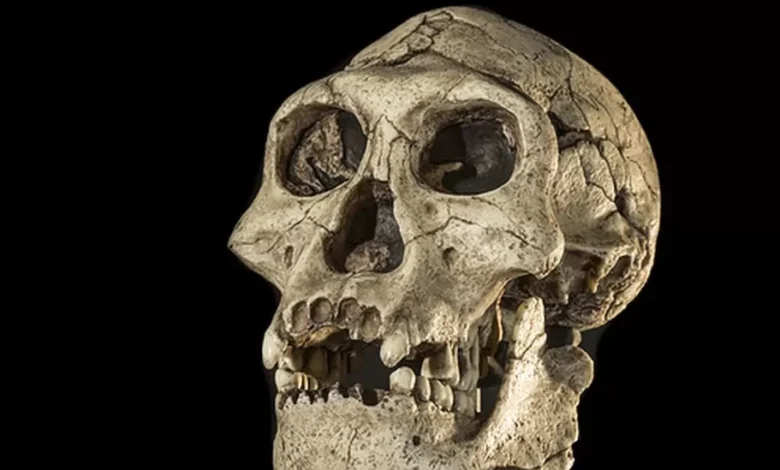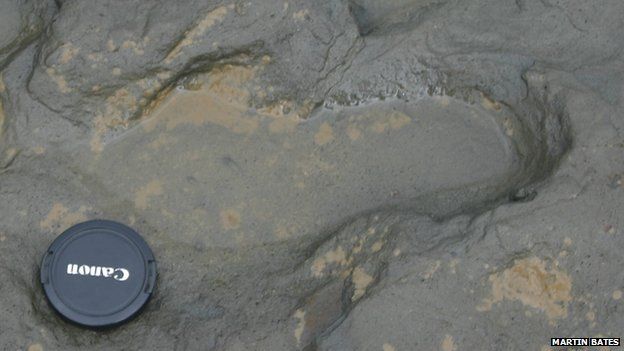Big freeze drove early humans out of Europe

A big freeze previously unknown to science drove early humans from Europe for 200,000 years, but they adapted and returned, new research shows.
Ocean sediments from 1.1 million years ago show temperatures suddenly dropped more than 5C, scientists say.
They say our early ancestors couldn’t have survived as they didn’t have heating or warm clothes.
Until now, the consensus had been that humans had existed in Europe continuously for 1.5 million years.
Evidence for the big freeze is found in sediments in the seabed off the coast of Lisbon, Portugal. Layers are deposited each year which are a record of sea conditions of that period. They also contain pollen grains which are a record of vegetation on the land.
Researchers at the IBS Centre for Climate Physics in Busan, in South Korea, ran computer model simulations using data from the sediments. They found that average winter temperatures plummeted in many areas in Europe well below freezing, even in the otherwise milder Mediterranean.
A drop of this magnitude may not seem too severe by today’s standards, where most have access to some heating, warm clothing and food, but that was not the case back then, according to Prof Axel Timmermann, who is director of the group.
“Early humans were not yet well adapted to cope with such extreme conditions,” he said. “There is no direct evidence that they could even control fire at this time. Therefore, the extremely cold and dry conditions over Europe and the corresponding lack of food, must have greatly challenged human survival.”

The oldest known human remains in Europe date back to about 1.4 million years ago and were recovered from what is now Spain. They suggest that a species of early humans known as Homo erectus, which originated in Africa, had arrived in Europe via southwest Asia at that time.
Prof Chronis Tzedakis of University College London, who led the research, turned to experts in early human settlements to see if the theory that the freeze had pushed them out of Europe was borne out by the fossil and archaeological evidence.
Following a thorough review, they found that there were human remains dating back to as recently as 1.1 million years ago in Spain, then a gap until about 900,000 years ago, from which period stone tools and footprints in ancient clays have been found in Happisburgh in Norfolk, England.
Because of the missing fossil evidence, it is unclear what species of humans were in Happisburgh, but later remains in other parts of Europe suggest they may have been a more advanced species called Homo antecessor.

The big freeze was over by the time early humans walked in Happisburgh were but it was still cold – cooler than it is in that part of Europe today. According to Prof Nick Ashton of the British Museum, it’s thought that those early humans had adapted enough to cope with the colder conditions to be able to come and stay in Europe.
“It may have triggered evolutionary changes in humans, such as increased body fat as insulation, or increased hair,” he told BBC News.
“It may also have led to technological developments such as improved hunting or scavenging skills, and abilities to create more effective clothing and shelters.”
It may have been these advances that enabled humans to cope with succeeding periods of extreme cold and occupy parts of Europe continuously ever since, according to Prof Chris Stringer of the Natural History Museum.
“Europe was a laboratory for human adaptation,” he said.
“A more resilient species came back into Europe either because they learned how to survive better, or it was a different species that had more sophisticated behaviours that enabled them to adapt.”
The Happisburgh species of humans might have evolved into the Neanderthals, who were well established by 400,000 years ago.
Our own species, Homo sapiens, is believed to have evolved in Africa by about 400,000 years ago. We were established in Europe by 42,000 years ago, co-existing briefly with Neanderthals before they went extinct about 40,000 years ago.










